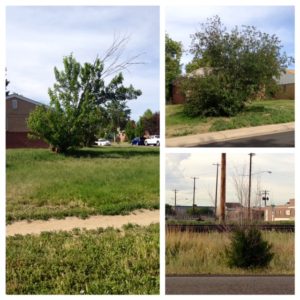Attending a Saturday morning tree-planting demonstration does not appeal to the masses. But it appealed to this arbor nerd. I enrolled with vigor, anxious to learn how to properly plant a maple in the dry Coloradan soil. The instructors harped on the dangers of tree staking and overwatering. But it turned especially riveting when the topic turned to pruning. Our affable instructor shifted to a somber tone and lowered his voice almost to a whisper, like a lieutenant preparing his troops for a ruthless adversary:
Trees in Colorado want to become bushes. And if given the opportunity to do so, that is exactly what they’ll do. It is easier for them to grow wide instead of tall. Simply stated, it’s your job to not let that happen.
For a tree to push nutrients from the roots to the farthest branches is hard work. It is more energy-intensive than simply pushing through saplings near the root system. Trees circumvent the strenuous work by taking the short route (if allowed to do so). I began to see this evidenced in lawns and parks across the city. Like trees with no trunks, these poor plants suffered stunting of unsightly varieties. They did not blossom into stately sycamores or flowering poplars. Instead, they appeared trapped between life as a tree and life as a shrub.
Not long after the seminar I had my own showdown with “suckers,” these sapling-sprouts that aimed to alter the trajectory of my silver maple. Armed with the pruning artillery to bring the foe to justice, I made quick work of the intruders. And today those trees are on the path to maturity.
Next week, Alli and I board a flight for our first visit to Rwanda. Rwanda suffered one of the gravest tragedies of our lifetimes. The genocide of 1994 nearly sunk the African nation that was already plagued with poverty. But it was at this rock-bottom moment when the Rwandan people averted the paths chosen by many of their neighbors. Where elsewhere corruption and racism were given the freedom to flourish, Rwanda’s leaders pruned them aggressively.
Today Rwanda surges into a nation of opportunity. Like a tree unencumbered by growth-inhibiting suckers, Rwanda stands tall. Prime ministers, dictators, and aristocrats watch astonishingly as poverty rates plummet and business investment soars. Through clear and aggressive reform, Rwanda is free to flourish. And it is beautiful to observe. Yes, pruning work still remains, but there is no denying the identity of this country. It is not to be confused with the failing states that border it. Rwanda is a thriving tree, on the course to becoming what its people want her to be.



Great metaphor Chris. While, like you, I am still engaging in Rwanda from afar, you seem to have a pulse on what is going on. It really seems to be a result of the top down leadership and the focus on development, security and progression. The leadership of the country is not afraid to make hard decisions in order for the country to grow. I am excited to hear your thoughts upon your return and gain a better insight into how the core development of the country is taking hold in the rural areas. Thanks Chris!
Appreciate the comment, Stephen. Looking forward to chatting with you soon.